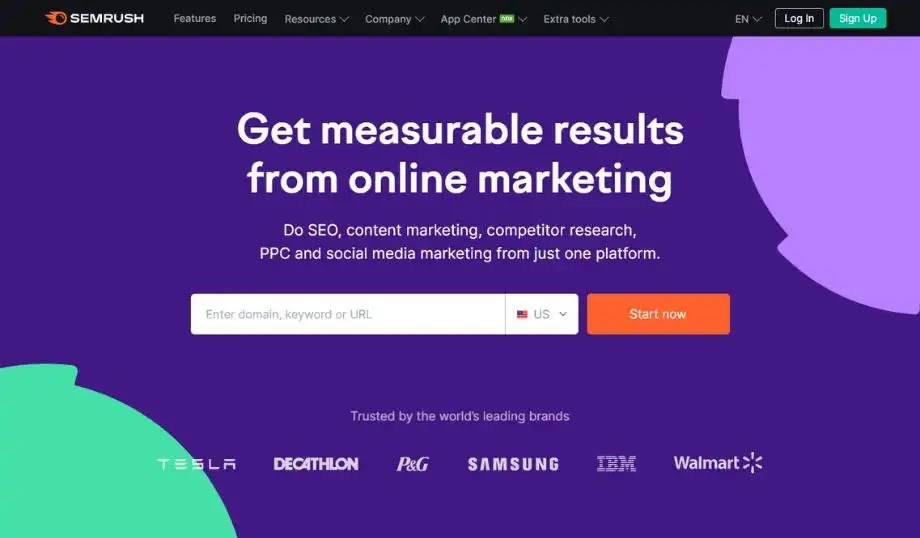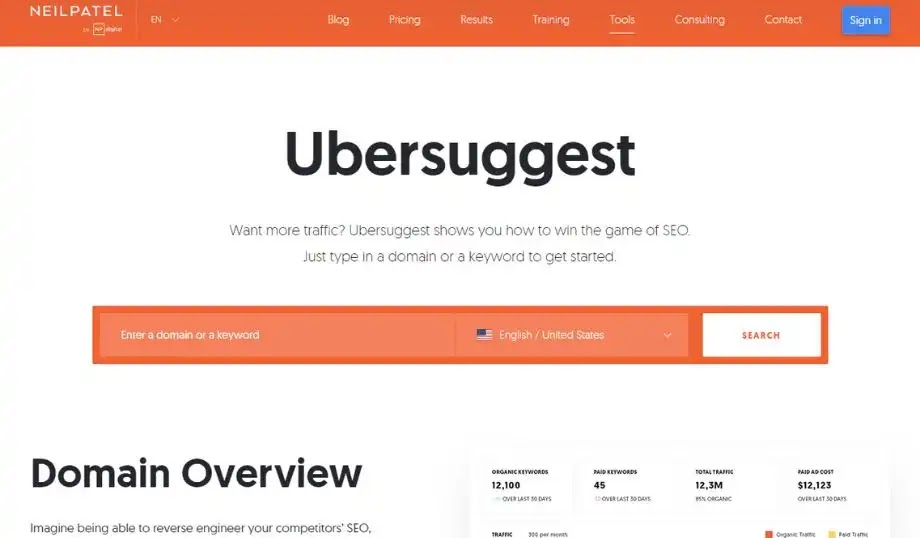In search engine optimization (SEO), keyword research is crucial to improving your website's ranking and driving organic traffic. By identifying the right keywords and incorporating them into your website's content and metadata, you can increase your chances of appearing higher in search engine results pages (SERPs).
In this article, we'll discuss the top keyword research tools for SEO, the features to look for when selecting a tool, and how to use these tools effectively.
Whether new to SEO or a seasoned pro, keyword research tools can help you stay ahead and improve your website's search engine visibility. So, let's dive in and find your edge with the best keyword research tools for SEO.
Why Keyword Research is Important for SEO
Keyword research is an essential aspect of search engine optimization (SEO) as it helps you understand what your target audience is searching for and what keywords they are using. Optimizing your website for those keywords can improve your search engine rankings and drive more organic traffic to your site.
There are several reasons why keyword research is crucial for SEO:
Understanding User Intent:
Keyword research helps you understand what your target audience is looking for when they search for a particular keyword or phrase. By analyzing search volumes and user behavior, you can identify keywords relevant to your business and optimize your website's content around those keywords. This way, you can create content that aligns with user intent, which can help improve your website's engagement and conversion rates.
Identifying High-Value Keywords:
Keyword research helps you identify high-value keywords relevant to your business and have high search volumes. Optimizing your website for these keywords can improve your chances of ranking higher in search engine results pages (SERPs), which can help drive more organic traffic.
Improving On-Page Optimization:
Keyword research can help you optimize your website's on-page elements, such as titles, meta descriptions, headers, and content. By incorporating keywords into these elements, you can signal to search engines that your website is relevant to those keywords, which can help improve your website's rankings.
Finding New Content Opportunities:
Keyword research can help you identify new content opportunities based on popular search queries and topics. Creating content that aligns with user intent and incorporates relevant keywords can improve your website's search engine visibility and attract more organic traffic.
Keeping Up with Changing Trends:
Keyword research is an ongoing process that involves regularly reviewing and updating your keyword strategy based on changing trends and search volumes. By staying up-to-date with the latest keywords and search trends, you can ensure that your website remains relevant and competitive in search engine rankings.
Keyword research is a critical component of SEO that can help you improve your website's search engine visibility, drive more organic traffic, and stay ahead of your competitors. You can create a more effective SEO strategy and achieve better results by identifying the right keywords and optimizing your website's content and metadata around those keywords.
Top 5 Best Keyword Research Tools for SEO
Google Keyword Planner
Google Keyword Planner also allows you to filter your search by location, language, and search network to get more accurate data for your target audience. You can also use it to generate new keyword ideas based on seed keywords, website URLs, or categories.
Overall, Google Keyword Planner is a reliable and straightforward keyword research tool that is great for beginners or businesses on a tight budget.
SEMrush
One of the unique features of SEMrush is its ability to analyze your competitors' keywords and provide you with insights into their top-performing keywords. This can help you identify gaps in your keyword strategy and find new opportunities to improve your rankings.
SEMrush also offers a keyword magic tool that allows you to generate thousands of keyword ideas based on your seed keywords or competitors' keywords. You can filter your search by match type, volume, competition, etc.
Overall, SEMrush is a comprehensive and powerful SEO tool ideal for businesses that want to take their keyword research to the next level.
Ahrefs
One of the unique features of Ahrefs is its ability to provide data on the click-through rate (CTR) of each keyword, which can help you prioritize high-value keywords that are more likely to drive organic traffic to your site.
Ahrefs also offers a content explorer tool that analyzes top-performing content for any keyword or topic. This can help you identify content gaps and find new opportunities to create content that resonates with your target audience.
Overall, Ahrefs is a powerful and comprehensive SEO tool ideal for businesses that want to take a data-driven approach to their keyword research and content strategy.
Moz Keyword Explorer
Moz Keyword Explorer is a keyword research tool that provides keyword volume, competition, and potential organic click-through rate (CTR) data. It also provides insights on related keywords, search suggestions, and keyword difficulty.
One of the unique features of Moz Keyword Explorer is its ability to provide data on the potential organic click-through rate (CTR) of each keyword. This can help you identify high-value keywords more likely to drive organic traffic to your site.
Moz Keyword Explorer also offers a "SERP analysis" feature that allows you to analyze the top-performing content for any keyword or topic. This can help you identify content gaps and find new opportunities to create content that resonates with your target audience.
Overall, Moz Keyword Explorer is a powerful and user-friendly keyword research tool ideal for businesses that want to take a data-driven approach to their SEO strategy.
Ubersuggest
One of the unique features of Ubersuggest is its ability to provide data on the top pages ranking for a particular keyword, as well as the estimated traffic, social shares, and backlinks for those pages.
This can help you identify what type of content is performing well for a particular keyword and find new opportunities to create content that resonates with your target audience.
Ubersuggest also offers a feature called "Content Ideas," which lists popular topics and headlines related to your seed keyword. This can help you generate new ideas and create content that aligns with user intent and search trends.
Overall, Ubersuggest is a great free keyword research tool ideal for businesses just starting with SEO or with a limited budget.
Each of these top 5 keyword research tools for SEO has unique features and benefits. Depending on your business needs and budget, you can select the best tool that suits your requirements. Google Keyword Planner is a great free tool for beginners; SEMrush and Ahrefs are comprehensive and powerful all-in-one SEO tools;
Moz Keyword Explorer is user-friendly and provides valuable data on pCTR, and Ubersuggest is a great free tool that provides data on top-ranking pages and content ideas. By using these keyword research tools effectively, you can gain a competitive edge in the SEO world and improve your website's search engine visibility and organic traffic.
Features to Look for in Keyword Research Tools
Keyword research is a crucial aspect of search engine optimization (SEO) as it helps you identify the right keywords and optimize your website's content and metadata around those keywords.
Knowing which keyword to choose can be overwhelming with so many different keyword research tools available. In this article, we'll discuss the features to look for in keyword research tools to help you select the right tool for your business needs.
Search Volume and Competition Data
Search volume and competition data are among the most important features to look for in a keyword research tool. This data can help you identify high-value keywords relevant to your business and with high search volumes. It can also help you determine how difficult it will be to rank for a particular keyword based on the level of competition.
Related Keywords and Long-Tail Variations
Another important feature of a keyword research tool is related keywords and long-tail variations. Related keywords are similar or related to your seed keyword, while long-tail variations are longer and more specific keyword phrases. These keywords can help you optimize your website's content for a wider range of search queries and attract more organic traffic.
User Intent and Trending Topics
Keyword research tools that provide insights on user intent and trending topics can help you create content that aligns with user needs and interests. By analyzing search trends and user behavior, you can identify topics that are currently popular or trending and create content that resonates with your target audience.
Competitive Analysis
Keyword research tools that offer competitive analysis features can help you identify gaps in your keyword strategy and find new opportunities to improve your rankings. By analyzing your competitors' keywords and top-performing content, you can gain insights into what type of content resonates with your target audience and what keywords drive the most organic traffic to their site.
Keyword Difficulty
Keyword difficulty is a metric that indicates how difficult it will be to rank for a particular keyword based on the level of competition. Keyword research tools that provide keyword difficulty data can help you identify keywords that are less competitive and easier to rank for, which can help you optimize your website's content around those keywords and improve your search engine visibility.
Integration with Other SEO Tools
Keyword research tools that integrate with other SEO tools, such as site audit or backlink analysis, can provide a more comprehensive view of your SEO strategy. Using integrated SEO tools, you can identify opportunities to improve your website's performance and create a more effective SEO strategy.
The features to look for in keyword research tools include search volume and competition data, related keywords and long-tail variations, user intent and trending topics, competitive analysis, keyword difficulty, and integration with other SEO tools.
By selecting a keyword research tool that offers these features, you can create a more effective SEO strategy and gain a competitive edge in search engine optimization.
How to Use Keyword Research Tools for Better SEO
Keyword research is an essential aspect of search engine optimization (SEO), as it helps you identify the right keywords and optimize your website's content and metadata around those keywords. However, more than simply conducting keyword research is required. Using keyword research tools effectively to achieve better SEO results would be best. This article will discuss using keyword research tools for better SEO.
Understand User Intent
Understanding user intent is one of the most important aspects of using keyword research tools for better SEO. User intent refers to the reason behind a particular search query. By understanding user intent, you can identify keywords relevant to your business and optimize your website's content around those keywords. Keyword research tools can help you identify user intent by providing data on related keywords and long-tail variations.
Analyze Search Volume and Competition
Keyword research tools provide data on search volume and competition, which can help you identify high-value keywords that are relevant to your business and have high search volumes. By analyzing search volume and competition data, you can determine which keywords are worth optimizing your website's content and how difficult it will be to rank for them.
Find Related Keywords and Long-Tail Variations
Keyword research tools provide data on keywords and long-tail variations, which can help you optimize your website's content for a wider range of search queries and attract more organic traffic. Incorporating these keywords into your website's content and metadata can improve your chances of ranking higher in search engine results pages (SERPs).
Analyze Competitors' Keywords
Keyword research tools can also help you analyze your competitors' keywords and identify gaps in your keyword strategy. By analyzing your competitors' top-performing keywords, you can identify what content resonates with your target audience and which keywords drive the most organic traffic to their site. This can help you find new opportunities to improve rankings and create content that aligns with user intent.
Prioritize High-Value Keywords
Keyword research tools can help you identify high-value keywords worth optimizing your website's content. By prioritizing these keywords, you can create a more effective SEO strategy and improve your website's search engine visibility.
High-value keywords have high search volumes and low competition, making them more likely to drive organic traffic to your site.
Regularly Review and Update Your Keyword Strategy
Keyword research is an ongoing process that requires regular review and updates based on changing trends and search volumes. Regularly reviewing and updating your keyword strategy ensures that your website remains relevant and competitive in search engine rankings.
Keyword research tools can help you stay up-to-date with the latest keywords and search trends and create a more effective SEO strategy.
Keyword research tools effectively are essential for better SEO results. By understanding user intent, analyzing search volume and competition, finding related keywords and long-tail variations, analyzing competitors' keywords, prioritizing high-value keywords, and regularly reviewing and updating your keyword strategy, you can create a more effective SEO strategy and gain a competitive edge in the world of search engine optimization.
Tips for Effective Keyword Research
Keyword research is a crucial aspect of search engine optimization (SEO) that involves identifying the right keywords or phrases to target in your website's content. Effective keyword research can help you rank higher on search engine results pages (SERPs) and attract more organic traffic to your website.
Here are some tips for effective keyword research:
Start with your business goals:
Before you begin your keyword research, it's essential to understand your business goals and objectives. Ask yourself questions such as, what are you trying to achieve? Who is your target audience? What keywords might your potential customers use to find your business? Understanding your business goals can help you create a list of relevant keywords to target.
Use a variety of tools:
Many tools are available to help with keyword research, such as Google Keyword Planner, SEMrush, Ahrefs, and Moz Keyword Explorer. These tools can help you identify high-volume, low-competition keywords relevant to your business.
Analyze your competitors:
Conducting a competitor analysis can help you identify the keywords that your competitors are ranking for and use them to optimize your content. You can use tools like SEMrush or Ahrefs to analyze your competitors' websites and identify their targeted keywords.
Use long-tail keywords:
Long-tail keywords are longer phrases that are more specific and targeted than broad keywords. They are less competitive and can help you rank higher on SERPs. Use long-tail keywords relevant to your business and target specific topics and areas of interest.
Consider user intent:
User intent is the reason behind a user's search query. Understanding user intent can help you create content that meets the needs of your target audience. For instance, users searching for "best shoes for running" are likely looking for product reviews or recommendations. You can use this information to create content that answers their query and provides them with valuable information.
Focus on relevancy:
It's essential to ensure that the keywords you choose are relevant to your business and content. Avoid using keywords unrelated to your business, which can hurt your SEO efforts and lead to a high bounce rate.
Use keyword variations:
Using variations of your target keywords can help you rank for multiple keywords and increase your chances of appearing on SERPs. For instance, if you are targeting the keyword "best running shoes," you can use variations such as "top-rated running shoes" or "best shoes for jogging."
Effective keyword research is crucial to the success of your SEO efforts. By following these tips, you can identify the right keywords to target and create content that meets the needs of your target audience. Regularly update and refine your keyword strategy to stay ahead of the competition and attract organic traffic to your website.
Conclusion:
Effective keyword research is a vital component of any successful SEO strategy. Keyword research tools can help you gain a competitive edge in the SEO world by identifying the most relevant and profitable keywords to target. These tools provide valuable insights into your target audience's search behavior and can help you optimize your content for improved rankings on search engine results pages.
Choosing the right keyword research tool that suits your needs and offers the necessary features, such as accurate search volume data, keyword difficulty analysis, and competitor analysis. By utilizing the best keyword research tools and features, you can stay ahead of the competition, attract more organic traffic to your website, and improve your online visibility and brand awareness.
Questions and Answers:
Why is keyword research important for SEO?
Answer: Keyword research helps you understand what your target audience is searching for and what keywords they use. Optimizing your website for those keywords can improve your search engine rankings and drive more organic traffic to your site.
What are some top keyword research tools for SEO?
Answer: Some popular keyword research tools for SEO include Google Keyword Planner, SEMrush, Ahrefs, Moz Keyword Explorer, and Ubersuggest.
What features should I look for in a keyword research tool?
Answer: Some important features to look for in a keyword research tool include the ability to analyze search volumes and competition, find related keywords and long-tail variations, and provide insights on user intent and trending topics.
How can I use keyword research tools to improve my SEO?
Answer: Use keyword research tools to identify high-value keywords relevant to your website and optimize your content around them. Incorporating these keywords into your website’s titles, meta descriptions, and content can increase your chances of ranking higher in page search engine results.
What are some tips for effective keyword research?
Answer: Some tips for effective keyword research include analyzing your competitors’ keywords, focusing on long-tail keywords, and regularly reviewing and updating your keyword strategy based on changing trends and search volumes. Additionally, consider using a mix of both broad and specific keywords to attract a diverse range of visitors to your site.











No comments:
Post a Comment